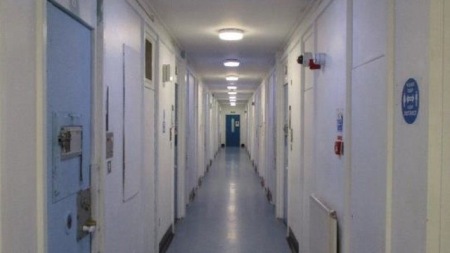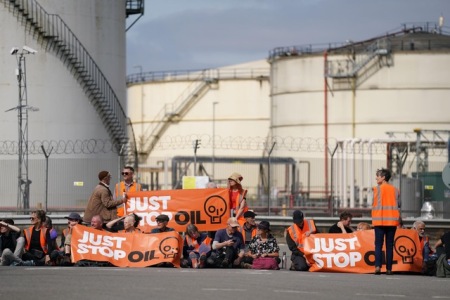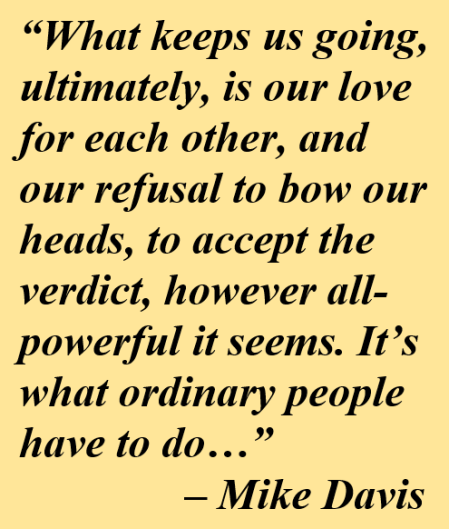 |
| 6-January-2023 |
I boarded a prison van along with five others and took my place in the locked metal box allocated to each prisoner. It was 27 September 2022, and we were headed for trial at the Birmingham High court. Our crime – climate protest.
 |
| A Just Stop Oil demonstration in London, 10 December. Photo by Steve Eason |
As we pulled out of the gates of the notorious HMP Foston Hall – ranked lowest of women’s prisons in a government Inspectorate Report, September 2022 – I thought of the women left behind on the remand wing, languishing in cramped, drab cells for twenty-three and a half hours a day. No wonder Foston Hall has the highest rate of violence and self-harm amongst its inmate population.
We were locked in narrow single cells converted to double occupancy by way of bunk beds, and our meals were eaten in our cells. Requests for basic amenities such as repairing a blocked sink were dealt with slowly, if not ignored altogether. Hot water was hard to come by.
With broken, cheap shelving and scuffed, peeling paint, a sense of hopelessness was baked into those featureless grey walls.
It was in Foston Hall that I tasted the overwhelming darkness that loss of agency in prison can evoke.
Like everyone on the remand wing, I quickly adjusted to the continuous “beep” of expended smoke alarm batteries. But for two evenings the smoke alarm, itself, emitted a high-pitched shriek every fifteen minutes. After several attempts to get help from a surly prison guard, she terminated any further discussion on the subject.
Slamming shut the narrow aperture on our door, her parting words underscored the desolation of such institutions. “This is prison life…Get used to it!”.
Staring in disbelief at the heavy metal door, a wave of impotency, injustice and rage exploded inside me. That long night I experienced a new level of empathy for the women around me and their periodic outbursts.
Prison expanded my understanding of what being privileged means. Unlike other inmates in Foston Hall, I had loved ones and a life to return to. Many don’t. I also had a reason to be there beyond adverse life circumstances.
 |
| Inside Foston Hall prison |
Who are the criminals?
There is something profoundly wrong when ordinary citizens – students, teachers, nurses, vicars, grandparents, construction workers, and academics – are compelled to take up the moral and political stance of civil disobedience, as a last resort, to activate political will.
Formerly law-abiding citizens are being imprisoned, fined, tagged, charged with excessive court costs, and threatened with lengthy suspended sentences.
This is a deliberate strategy by the government and judiciary to silence voices challenging the status quo of political apathy and collusion with the fossil fuel industry.
A few of the most egregious cases are:
- Louis McKechnie, a 21-year-old former mechanical engineering student from Weymouth. Refused bail, Louis will remain in prison until his trial in 2023.
- Josh Smith, 29, a construction worker from Manchester. Held on remand for five months. Awaits trial in 2023.
- Louise Lancaster, 56, a former schoolteacher from Cambridge was fined £22,000 in court costs for hanging a Just Stop Oil banner from a gantry on the M25 following 40 degree temperatures in England this year – a temperature escalation climate scientists were shocked by. After ten days in prison, Lancaster was released but banned from any form of protest until October 2023. She faces a year in prison if she breaks this.
These penalties stand in stark contrast to the position the courts take vis a vis the relentless contravention of global agreements by the fossil fuel industry.
International agreements reached at the conferences of the parties (COPs) over the past three decades, designed to halt the spiralling destruction of our planetary systems, are regularly breached by an industry with deep pockets and strong political affiliations.
The legal system undermines climate policies
More dangerous perhaps is the role the legal system plays in enabling corporations and fossil fuel investors to undermine efforts by nation states to limit global warming.
Fossil fuel companies use a mechanism called investor-state dispute settlement (ISDS) in international corporate tribunals, to claim compensation for climate policies they see as “illegally” cutting into their profits. Bypassing local courts, companies are filing arbitration cases that frustrate new climate regulations, using ISDSs.
One example is Rockhopper. After a four-year case against the Italian government, whose moratorium on oil projects within a twelve-mile radius of its coastline effectively blocked this British company’s plans, in September 2022 Rockhopper was awarded €I90 million euros plus interest.
Although its actual investment amounted to $40-50 million, the company claimed a foregone loss of profits estimated between $220-300 million. As a result, Rockhopper’s share price doubled, and the company plans to use this “profit” to drill for oil near the Malvinas islands in the south Atlantic. Italy is challenging the tribunal’s decision.
Italy has left the Energy Charter Treaty, the international agreement under which ISDS cases are brought. France, The Netherlands, Spain and Poland are on their way out, and Germany and Belgium are thinking about it.
Challenging a judiciary in step with governments and corporations
“It’s a David and Goliath situation”, remarked a vicar sitting beside me in the autumn sun. We were part of a group of 51 ordinary citizens, peacefully but purposively blocking the main entrance to Kingsbury Oil terminal in Warwickshire, the UK’s largest inland oil depot, on 14 September 2022.
The intention of this action was to challenge the position of the government and courts by breaking a court injunction preventing protest at this site.
Struggling to stem the rising tide of civil disobedience, the UK government and judiciary are pursuing a strategy of applying draconian measures against climate activism, largely outside of the public’s view.
 |
| Action at Kingsbury Oil Terminal, 14 September 2022 |
That afternoon, all 51 of us were arrested for contempt of court, for climate protest outside of Kingsbury Oil Terminal. We were taken to police cells across the Midlands.
At our first court appearance, three of us stood in the dock together. To demonstrate our refusal to accept the legal authority of an injunction designed to protect the interests of the fossil fuel industry while penalising climate protestors, we each turned our back as the judge entered the court. Tension rippled through the room as shocked court personnel duly stood. The judge proceeded to lay out the contempt of court charges.
Stating our position in unison, and effectively drowning out her voice, we were quickly bundled out of the courtroom and sent down on remand. Later I heard that every person had staged a similar action, which meant that night all 51 of us were sent to prisons dotted across the Midlands and Outer London.
Initially I was remanded to HMP Peterborough, along with five others. The extra freedoms permitted at Peterborough prison allowed us to meet, and to mingle with other inmates.
Despite the risk of incurring steeper sentences and higher court costs, refusing to make a guilty plea provides a valuable opportunity for a counter defence against the oil industry, in a court environment. We went to work preparing our cases in our cells.
After a week we were moved to HMP Foston Hall. In this new environment, despite the isolation and lack of resources, we managed to create a co-ordinated defence, having decided to self represent.
When we were finally brought before the Birmingham High Court, after a few hours held in the basement holding cells, we ascended the stairs to the courtroom. There, upon entering the dock, each of us outlined specific points regarding the nefarious actions of the fossil fuel industry, and the consequences both past and present.
We told the court that today in the UK, injunctions are frequently used to protect an industry that is well-documented to have deliberately misled the public for decades. Research by the industry’s own scientists sixty years ago made accurate predictions of the consequences of burning fossil fuels, including the perilous impacts of climate change, now an everyday reality. (There’s more about this in a BBC documentary and on the Climate Files site.)
We also raised the matter of context. The UK government declared a climate emergency in May 2019, yet no proportionate change in policy, or the law, has been passed since.
Laws do change according to evolving societal values, knowledge, and conditions. In court we cited examples such as laws regarding homosexuality, which until 1967 was illegal in the UK, a punishable “offence”.
The judge appeared to be affected by our testimony but ultimately unwilling to re-evaluate her ruling. We were all convicted of breaking a court injunction designed to ban climate protest outside Kingsbury Oil Terminal.
I was sentenced to 56 days in prison, with a suspended sentence of 30 days, allowing for time already spent in prison.
One of my fellow activists, a social worker and grandmother, was given 156 days for being a “repeat offender”. She was sent back to serve time in HMP Foston Hall.
The UK government is bent on criminalizing climate protestors. To date, dozens have been incarcerated in the UK: at present, 12 prisoners of conscience remain in prison on remand. Others await jury trials.
However, one aspect of civil disobedience is that it engenders thousands of conversations between climate activists and members of the public, the police and state workers in the judiciary and prison system.
Many are genuinely curious as to why we would jeopardize our freedom for such a cause. And many reveal they know little about the climate or ecological crisis. People are often shocked on realizing how absent the true picture is from government and public forums, including the media.
We are living in a time of unprecedented crisis. A profound change of course is required by society and its leaders. The knowledge and solutions are out there. What is missing is the political will to implement these.
None of us can afford to be bystanders to the needless destruction unfolding around us.
Citizens have changed, and do change, history.
And until our government responds with authentic leadership to the meta crisis, climate activism in the form of civil disobedience will be part of all our lives.
More on People & Nature about climate action







Article written on a PC which ..." shows that the construction of an average 24-kilogram computer and 27-centimetre monitor requires at least 240 kilograms of fossil fuel, 22 kilograms of chemicals and 1,500 kilograms of water – or 1.8 tons in total, the equivalent of a rhinoceros or sports utility vehicle." NOT including electricity.
ReplyDeletehttps://news.un.org/en/story/2004/03/96452
More virtue signaling twaddle.